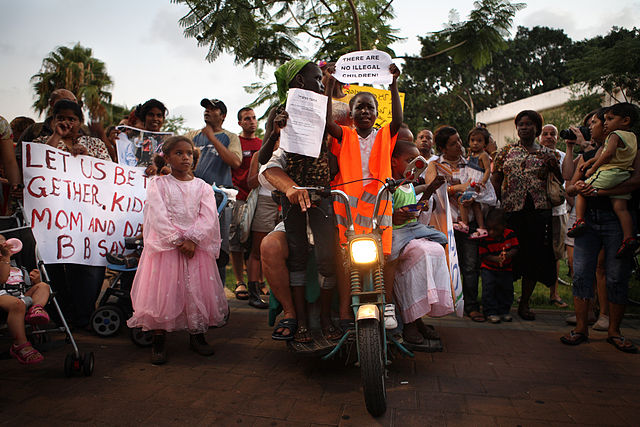Attempts to dissuade potential migrants from coming to the UK are ineffective gimmickry
The UK has been criticised for its anti-humanitarian stance when it comes to the migrants camp in Calais, where conditions are appallingly bad. Defenders of the migrants point to the horrendous conditions from which many of them have fled, yet the Government’s rhetoric has been unfailingly caustic. However, the attempts – fences and security cameras – used to dissuade and prevent their entry into the UK are gimmickry and won’t put off potential migrants, according to Rebecca Partos.

Immigration demonstration in Tel Aviv (Credit: Roy Boshy, CC BY SA 2.0)
Migrants are so desperate to get to Britain that they have even attempted to hitch a ride with Nigel Farage. According to the UKIP leader, he was ‘surrounded by scores of migrants, crossing the motorway and trying the doors on my car’. In recent months, repeated attempts by migrants in Calais to cross the Channel Tunnel have become emblematic of government failings, foreign lawlessness and lack of control.
Daily coverage, including lurid photographs and short video clips of migrants climbing security fences and clinging on to the undersides of lorries, have ensured that the immigration issue has once again become a headline news story. Home Secretary Theresa May and her French equivalent have gone so far as to pen a joint piece assuring their worried voters that the situation is a ‘top priority’ for both governments. The Chief Executive of Eurotunnel described the ongoing situation as a ‘systematic invasion’ that had been meticulously planned by migrants.
With media reports claiming hundreds, even thousands, of nightly attempts to secure illicit entry to the UK via the Channel Tunnel, there has been little sympathy for those suffering from the inevitable injuries and even deaths. Instead, coverage has concentrated on ‘knife-wielding illegal immigrants’, leaping onto moving vehicles and slicing their way into tarpaulin-covered lorries. The prospect of a surge of uncivilised, possibly violent individuals from warzones far away has produced a new wave of fear and hostility towards migrants.
What is going on in Calais has been represented as nothing less than an invasion – a battle for British soil and British culture – and calls for the British Army to step in have not helped to calm the situation. Cameron has likened the migrants to an insect-like ‘swarm’ and received international criticism for using dehumanising language, which he has recently denied. Foreign Secretary Philip Hammond referred to ‘marauding’ migrants who threaten our quality of life and pose something of an existential threat to our society.
Beyond the tough rhetoric, the Conservative government’s response has been limited, and does not appear to have calmed public concerns. Theresa May has pledged to spent £7 million reinforcing fences around the Eurotunnel; this is in addition to the £12 million agreed in late 2014 to be spent on upgrading physical security at Calais and some £1.4 million on tightening up security in the lorries’ waiting areas. Such amounts seem trivial when one considers that Eurotunnel has itself spent more than 160 million euro (£113 million) in security measures in the first six months of 2015 alone.
To further compound the issue, the UK’s requirement that checks on migrant status should take place outside its borders means that it is unclear quite whose responsibility it is to contain the migrants. The French have called for greater financial support to help fund their efforts and have threatened to abandon their responsibilities if this is not forthcoming. Vague comments from ministers about improving cooperation between the British and French governments have not led to anything concrete.
Yet the situation is not quite as severe as it seems, with the approximately 35 migrants making it through the Channel Tunnel every day a tiny fraction of those in the UK with irregular status. The hundreds, even thousands, of daily attempts to enter Britain are, in fact, multiple attempts by the same individuals. The Calais issue has become symbolic of the UK’s battle to control immigration because it is so visible. If ministers were seriously concerned by illegal, or irregular, migration, they would not be focusing so heavily on the tiny minority who, as Cameron has put it, ‘break into’ the UK, but those who enter the UK legally and overstay their visas. Yet, dealing with those in the country already is significantly more complex, particularly when ID cards are not compulsory and unlikely to be introduced, given their ‘un-British’ associations.
True, there have been moves by the Conservative government to make life more difficult for those migrants living in the UK illegally, but these measures are unlikely to make much difference. Recent legislation has made it more difficult for irregular migrants in the UK to obtain a driving licence, rent privately or open a bank account. Cameron and his ministers have been making noises about reducing access to benefits – yet few migrants come to the UK for this kind of financial support, most just want to work (in the deregulated and dangerous black market, if necessary) and improve their prospects. Making life more difficult for illegal immigrants is unlikely to be much of a deterrent to those who are willing to put their lives at risk in an effort to enter the UK.
Overall, immigration policy is becoming tougher – and less humane. Immigration is increasingly being seen as a security threat rather than a question of resources (finding enough school places or hospital beds for everyone), or even a humanitarian issue. Attempts to dissuade potential migrants from coming to the UK are gimmicks rather than serious statesmanship. Higher fences and infra-red security cameras may prevent a few more migrants from crossing the 20 miles of sea between Calais to Kent, but many will continue to take great risks to do so.
—
This post originally appeared on the PSA blog and is reposted with the permission of the blogs editor. It represents the views of the author and not those of Democratic Audit or the LSE. Please read our comments policy before posting.
—
 Rebecca Partos is an Associate Tutor in Politics and a Research Student at the University of Sussex
Rebecca Partos is an Associate Tutor in Politics and a Research Student at the University of Sussex





 Democratic Audit's core funding is provided by the Joseph Rowntree Charitable Trust. Additional funding is provided by the London School of Economics.
Democratic Audit's core funding is provided by the Joseph Rowntree Charitable Trust. Additional funding is provided by the London School of Economics.
Attempts to dissuade potential migrants from coming to the UK are ineffective gimmickry: The UK has been criti… https://t.co/Nycq65U4FI
Attempts to dissuade potential migrants from coming to the UK are ineffective gimmickry https://t.co/2nPtMW2mBF #Option2Spoil
Attempts to dissuade potential migrants from coming to the UK are ineffective gimmickry https://t.co/XLhHmXkvqy
Attempts to dissuade potential migrants from coming to the UK are ineffective gimmickry https://t.co/53akDNwQ7N https://t.co/3ZvaAfnGw6